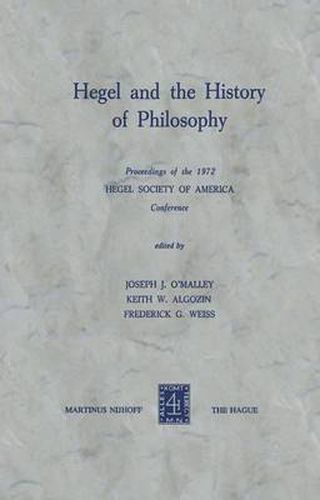Readings Newsletter
Become a Readings Member to make your shopping experience even easier.
Sign in or sign up for free!
You’re not far away from qualifying for FREE standard shipping within Australia
You’ve qualified for FREE standard shipping within Australia
The cart is loading…






This title is printed to order. This book may have been self-published. If so, we cannot guarantee the quality of the content. In the main most books will have gone through the editing process however some may not. We therefore suggest that you be aware of this before ordering this book. If in doubt check either the author or publisher’s details as we are unable to accept any returns unless they are faulty. Please contact us if you have any questions.
The papers published here were given at the second biennial conference of the Hegel Society of America, held at the University of Notre Dame, November 9-11, 1972. They appear in an order which reflects roughly two headings: (1) Hegel’s conception of the history of philosophy in general, and (2) his relation to individual thinkers both before and after him. Given the importance of the history of philosophy for Hegel, and the far-reaching impact of his thought upon subsequent philosophy, it becomes immediately apparent that we have here only a beginning. At the conference, cries went up Why not Hegel and Aristotle, Aquinas, HusserI and Hart mann? Indeed, why not? The answer, of course, might be given by Hegel himself : if we wish to accomplish anything, we have to limit ourselves. We trust that future conferences and scholarship will bring to light these relationships and the many more which testify to Hegel’s profound presence in the mainstream of past and present thought. It is furthermore no accident that the renaissance of Hegelian studies has brought with it a rebirth of the history of philosophy as something relevant to our own problems. For Hegel, the object of philosophy is alone the truth, the history of philosophy is philosophy itself, and this truth which it gives us cannot be what has passed away.
$9.00 standard shipping within Australia
FREE standard shipping within Australia for orders over $100.00
Express & International shipping calculated at checkout
Stock availability can be subject to change without notice. We recommend calling the shop or contacting our online team to check availability of low stock items. Please see our Shopping Online page for more details.
This title is printed to order. This book may have been self-published. If so, we cannot guarantee the quality of the content. In the main most books will have gone through the editing process however some may not. We therefore suggest that you be aware of this before ordering this book. If in doubt check either the author or publisher’s details as we are unable to accept any returns unless they are faulty. Please contact us if you have any questions.
The papers published here were given at the second biennial conference of the Hegel Society of America, held at the University of Notre Dame, November 9-11, 1972. They appear in an order which reflects roughly two headings: (1) Hegel’s conception of the history of philosophy in general, and (2) his relation to individual thinkers both before and after him. Given the importance of the history of philosophy for Hegel, and the far-reaching impact of his thought upon subsequent philosophy, it becomes immediately apparent that we have here only a beginning. At the conference, cries went up Why not Hegel and Aristotle, Aquinas, HusserI and Hart mann? Indeed, why not? The answer, of course, might be given by Hegel himself : if we wish to accomplish anything, we have to limit ourselves. We trust that future conferences and scholarship will bring to light these relationships and the many more which testify to Hegel’s profound presence in the mainstream of past and present thought. It is furthermore no accident that the renaissance of Hegelian studies has brought with it a rebirth of the history of philosophy as something relevant to our own problems. For Hegel, the object of philosophy is alone the truth, the history of philosophy is philosophy itself, and this truth which it gives us cannot be what has passed away.